|
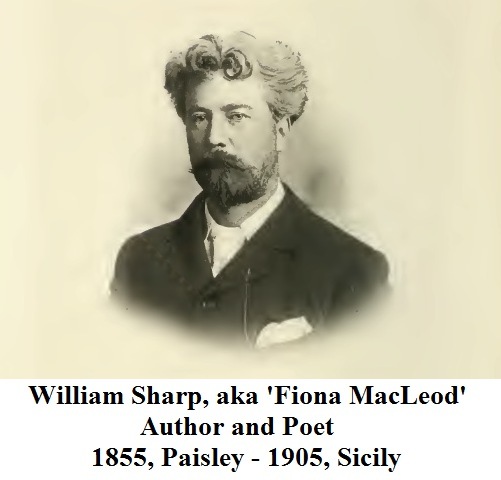
William Sharp (12
September 1855, Paisley – 12 December 1905, Sicily) was a Scottish poet,
literary biographer, and romantic story-teller, who, from 1893 wrote
also as 'Fiona MacLeod', a pseudonym that was mostly kept secret during
his lifetime. He was also an editor of the poetry of Ossian, Walter
Scott, Matthew Arnold, Algernon Charles Swinburne and Eugene
Lee-Hamilton.
Sharp Genealogy
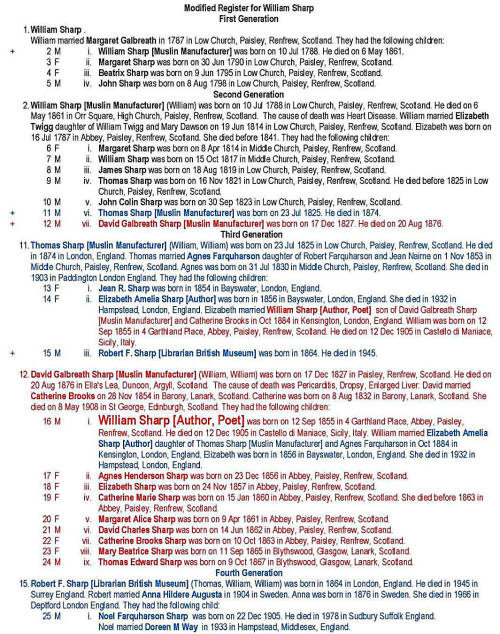
Sharp/MacLeod
Bibliography
See
02WilliamSharpBibliography.pdf
Brief Life Story of
William Sharp
William Sharp, as the eldest son of a wealthy family, was educated at
Glasgow Academy and the University of Glasgow, the latter which he
attended from 1871 to 1872 without completing a degree.

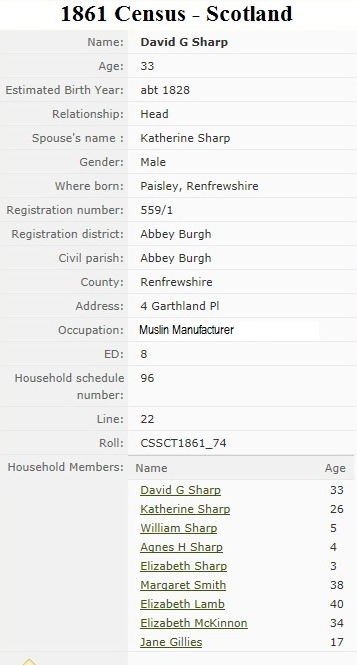
In 1872 William
contracted typhoid, but then from 1874-5 worked in a Glasgow law office.
His father David, died in 1876 in Dunoon. It should be noted that
William was the present informant to the Registrar on his father's
death, and that soon thereafter, William's health broke down again. His
ever-loving mother then sent him away on a voyage to Australia with
hopes that he would recuperate.

On his return in 1878
William took a position in a bank in London, and, while there, he was
introduced to Dante Gabriel Rossetti by Sir Noel Paton, and joined the
Rossetti literary group that included Hall Caine, Philip Bourke Marston
and Swinburne.
In late 1884, William married his 1st cousin Elizabeth Amelia Sharp.
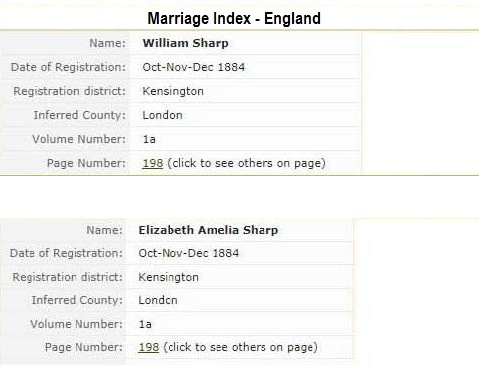
William and Elizabeth
travelled widely in Europe, and on one of these trips William developed
an intensely romantic but platonic attachment to an Edith Wingate Rinder,
another writer of the consciously Celtic Edinburgh circle surrounding
Patrick Geddes and "The Evergreen." It was to Edith ('EWR') that he
attributed the inspiration for his writings thereafter as 'Fiona
MacLeod', and to whom he dedicated his first 'MacLeod' novel ('Pharais').
Thus from 1891 he started to devote himself to writing full time. It so
happened that Elizabeth's father, William's Uncle Tom, and his wife
Agnes Farquharson, had also had a son Robert who by this time was an
Assistant Librarian in the British Museum, London. Thus, both William
and Elizabeth would have had a close ally for any researching they might
need to do for their literary efforts. Cousin Robert eventually rose by
1911 to become a First Class Assistant in the Department of Printed
Books in the British Museum.
In 1895, literary works
such as 'Mountain Lovers' and 'Pharais' signalled a dramatic change in
William's's life with noticeable energy being shown in his writing as
reported by readers and critics alike. It was through these fictional
characters that most of his financial success came as a writer. Wide
distribution of his works at home and abroad eventually established him
as a genius of his era.
William had an
interesting relationship with W. B. Yeats during the 1890s concerning
Celtic Revival. Yeats initially found 'MacLeod' acceptable and 'Sharp'
not! Very, very few learned of this dual identity until after William's
death in 1905.
On occasions when it was
necessary for 'Fiona MacLeod' to write to someone unaware of the dual
identity, William would dictate texts to his sister (Mary Beatrice
Sharp), whose handwriting would then be passed off as 'Fiona's'
manuscript. Also during his 'MacLeod' period, William was a member of
the Hermetic Order of the Golden Dawn.
William's health started
to fail more and more after the turn of the century, and overwork and
anxiety contributed to his accelerating journey to the grave .... and
peace at last for mind and body. Again, seeking remission, and after a
fond farewell to his mother, he and Elizabeth took refuge in Sicily, and
it was there in 1905 that he died and was buried at Castello di Maniace.
His widowed mother was
grief-stricken, and she followed her husband and eldest son to the grave
in 1908.

In 1911 and 1912, his
widow Elizabeth published, in two volumes, a biographical memoir, that
among other things, not only provides an explanation of the creative
necessity lying behind William's identity deception, but also her edited
versions of many of his works. Living independently and comfortably,
widow Elizabeth survived her eminent husband for twenty-seven years
after his passing.
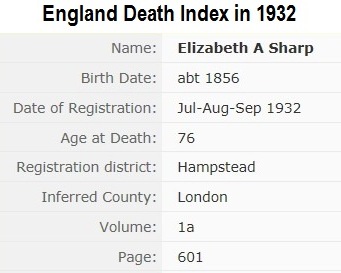
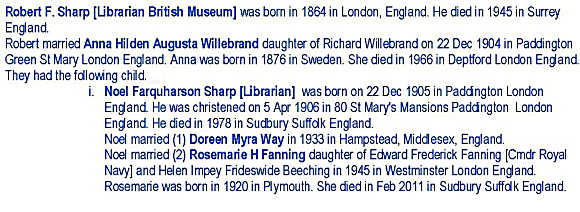
Now,
Volume One - 'Pharais And
The Mountain Lovers' by Elizabeth Amelia Sharp - 1911
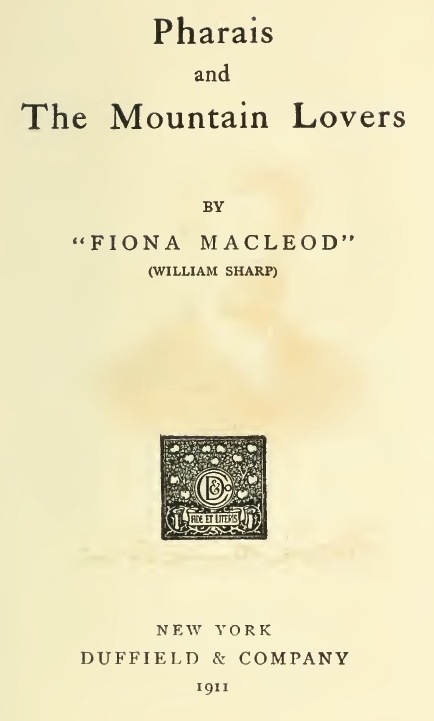
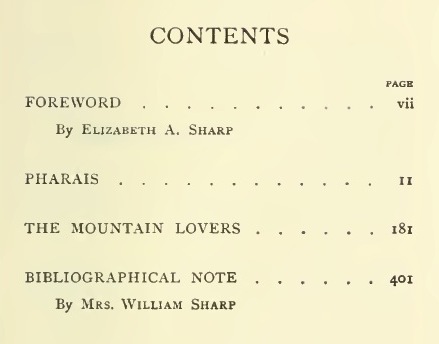
Foreword.pdf
Pharais.pdf
The Mountain Lovers.pdf
William Sharp
A Memoir [Volume 1] (pdf)
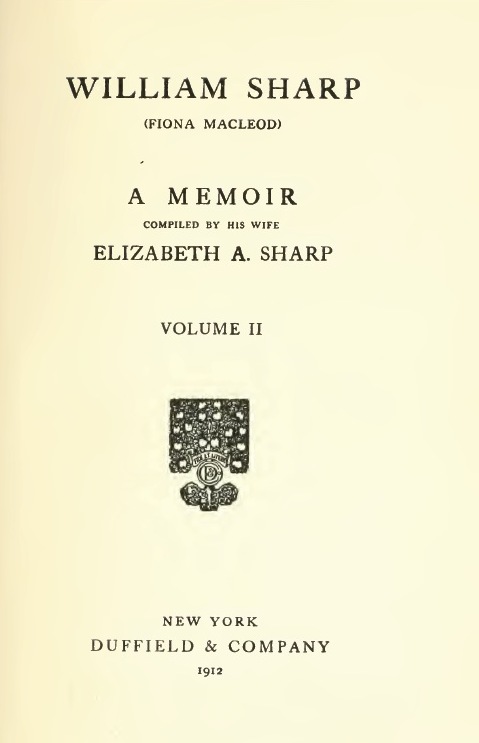
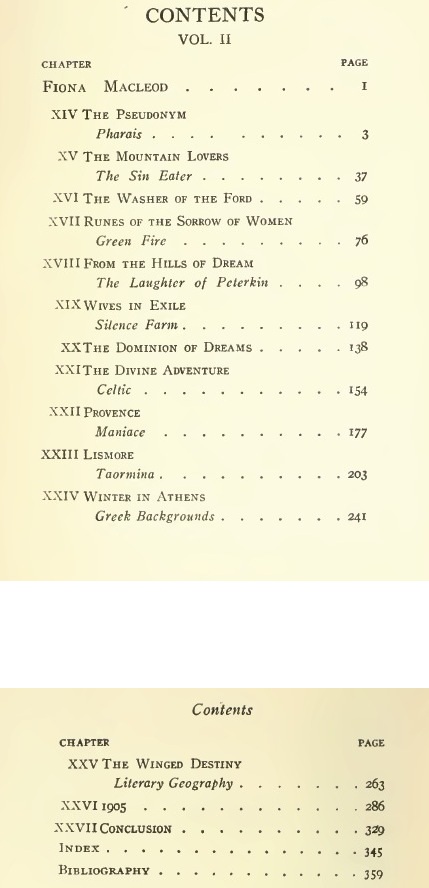
Chapter 1
The Pseudonym
Chapter 2 The Mountain Lovers
Chapter 3 The Washer At The
Ford
Chapter 4 Green Fire
Chapter 5 From the Hills of
Dream
Chapter 6 Wives in Excile
Chapter 7 Dominion of
Dreams
Chapter 8 The Devine
Adventure
Chapter 9 Provence
Chapter 10 Lismore
Chapter 11 Winter in Athens
Chapter 12 The Winged Destiny
Chapter 13 Year 1905
Chapter 14 Conclusion
Index
Additional Information can be found
here |

